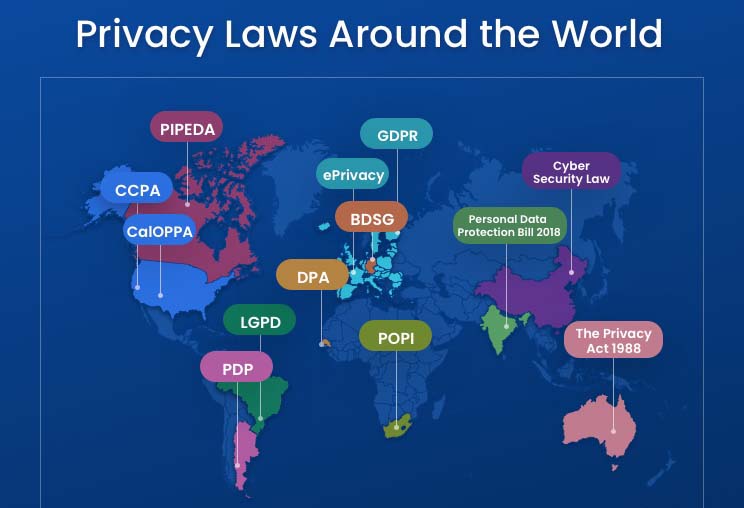CRM and U.S. Data Privacy Laws: What You Need to Know
In today’s data-driven business landscape, Customer Relationship Management (CRM) systems are indispensable tools for managing customer interactions, streamlining sales processes, and boosting overall business growth. However, operating a CRM within the United States requires a deep understanding of the evolving landscape of data privacy laws. Navigating these regulations can be complex, but compliance is crucial for maintaining customer trust, avoiding hefty fines, and ensuring long-term business sustainability. This article provides a comprehensive overview of CRM usage in the U.S. and its intersection with key data privacy laws, empowering decision-makers to make informed choices and implement compliant practices.
Background: The Rise of Data Privacy Concerns in the U.S.
Unlike the European Union with its comprehensive General Data Protection Regulation (GDPR), the U.S. adopts a more fragmented, sector-specific approach to data privacy. This means there isn’t a single, overarching federal law governing data privacy for all businesses. Instead, various federal and state laws address specific types of data and industries.
This patchwork of regulations has emerged in response to growing public concerns about data breaches, misuse of personal information, and a lack of transparency in how companies collect, use, and share consumer data. High-profile data breaches and increasing awareness of the value of personal data have fueled the demand for stronger privacy protections.
Key drivers behind the rise of data privacy concerns in the U.S. include:
- Increased Data Collection: Businesses are collecting more data than ever before, from website browsing history to purchase patterns and location data.
- Technological Advancements: Sophisticated tracking and profiling technologies make it easier for companies to analyze and monetize personal data.
- Data Breaches: High-profile data breaches have exposed millions of consumers’ personal information, leading to identity theft and financial losses.
- Consumer Awareness: Consumers are becoming more aware of their data privacy rights and are demanding greater control over their personal information.

As a result, states like California, Virginia, and Colorado have enacted comprehensive data privacy laws, setting the stage for a potential federal privacy law in the future. Understanding these laws is critical for any business using a CRM system to manage customer data in the U.S.
Key U.S. Data Privacy Laws Impacting CRM Usage
Several federal and state laws significantly impact how businesses can collect, use, and store customer data within their CRM systems. Here’s a breakdown of the most relevant regulations:
-
California Consumer Privacy Act (CCPA) & California Privacy Rights Act (CPRA): Considered the most comprehensive state privacy law in the U.S., the CCPA, as amended by the CPRA, grants California residents several rights, including the right to know what personal information businesses collect about them, the right to delete that information, and the right to opt-out of the sale of their personal information. The CPRA also established the California Privacy Protection Agency (CPPA) to enforce the law.
-
Virginia Consumer Data Protection Act (CDPA): Similar to the CCPA, the CDPA grants Virginia residents rights regarding their personal data, including the right to access, correct, delete, and obtain a copy of their personal data. It also provides the right to opt-out of targeted advertising, the sale of personal data, and profiling.
-
Colorado Privacy Act (CPA): The CPA gives Colorado residents similar rights to those in California and Virginia, including the right to access, correct, delete, and obtain a copy of their personal data. It also includes the right to opt-out of targeted advertising, the sale of personal data, and profiling.
-
Children’s Online Privacy Protection Act (COPPA): COPPA protects the online privacy of children under 13. It requires websites and online services to obtain verifiable parental consent before collecting, using, or disclosing personal information from children. This is particularly relevant for CRMs that may collect data from children through marketing campaigns or customer support interactions.
-
Health Insurance Portability and Accountability Act (HIPAA): HIPAA protects the privacy and security of protected health information (PHI). If your business handles PHI, such as a healthcare provider using a CRM to manage patient data, you must ensure your CRM system is HIPAA compliant.
-
Telephone Consumer Protection Act (TCPA): The TCPA regulates telemarketing calls and text messages. Businesses using CRMs for outbound marketing campaigns must comply with the TCPA’s restrictions on contacting consumers without their prior express consent.
Feature Comparison Chart: Privacy-Focused CRM Features
To navigate the complexities of data privacy laws, businesses should prioritize CRM systems that offer built-in privacy features. Here’s a comparison of key features and their importance:
| Feature | Description | Importance |
|---|